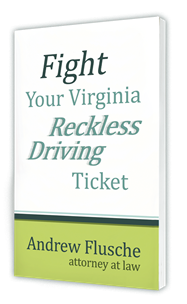How Long Does a Speeding Ticket Stay on Your Record in Virginia?
A speeding ticket can feel like a punch to the gut, especially when you factor in the immediate financial sting. But the consequences can extend far beyond paying a fine.
In Virginia, a speeding violation impacts your driving record, raises insurance rates, and may limit future driving privileges. But how long does a speeding ticket remain on your record in Virginia?
The answer depends on a few factors. Below, Flusche & Fitzgerald break down how long a speeding ticket stays on your record and what it means for you.
Virginia Laws and Ordinances on Speeding
Virginia sets speed limits based on the type of road and posts these limits. Unless otherwise posted, the general maximum speed limit on state highways is 55 mph.
On interstates, the speed limit is typically between 60-70 mph but can be vary depending on the specific stretch of road.
The state imposes fines ranging from $6 to $8 per mile over the speed limit and other fees up to $250, depending on the jurisdiction.
Drivers caught going 20 miles per hour over the limit or above 85 miles per hour can face charges of reckless driving, a criminal offense in Virginia.
Reckless driving is not just a traffic violation—it’s a Class 1 misdemeanor. If convicted, it stays on your driving record for 11 years and can result in fines up to $2,500, jail time, and a six-month license suspension.
Virginia’s Point System
In addition to possible criminal penalties, speeding results in moving traffic violations that carry demerit points. These points can quickly add up and lead to other issues affecting your license and driving privileges.
The DMV will assess points according to how many miles per hour you drove above the speed limit.
- 1-9 mph—results in a 3-point violation on your driving record;
- 11-19 mph—ups the ante to a 4-point violation; and
- 20 mph or more—leads to a hefty 6-point violation, which can lead to license suspension if you accumulate enough points within a specific timeframe.
Virginia’s point system is meant to keep roads safe and hold drivers accountable. Avoiding such violations is essential to maintaining a clean driving record.
How Long Do Speeding Tickets Stay on Your Record?
It is typical for speeding tickets to stay on your Virginia driving record for five years, but severe offenses like reckless driving stick around for up to 11 years.
These records are important because they affect how the Department of Motor Vehicles (DMV) and law enforcement evaluate your driving habits. Accumulating too many points from speeding or other traffic violations could lead to license suspension.
It’s essential to understand the difference between points and the conviction itself. Suppose you were speeding so far above the speed limit that the State charged you with a criminal reckless driving offense.
While the criminal conviction remains on your driving record for the designated period, associated demerit points only affect you for two years.
How Long Does a Speeding Ticket Stay on Record for Insurance Purposes?
One of the most significant concerns for drivers is how long a speeding ticket stays on their record for insurance purposes. Speeding tickets signal a higher risk to insurers and consequently raise your insurance premiums.
Speeding tickets and associated points stay on your record for three to five years in most U.S. states. The duration varies by state and depends on the severity of the violation. Any ticket in that window can hike up your premiums. After the designated period of time, check with your insurer to clarify whether the ticket still impacts your premium based on their policies.
Is It Bad to Have a Speeding Ticket on Your Record?
In addition to the increased insurance rates, having a speeding ticket on your record can result in:
- Challenges in getting insurance. A history of multiple speeding tickets could make it harder to secure coverage. It can even prevent you from receiving options from certain insurers.
- Driver’s license suspension. When drivers accumulate excessive demerit points from speeding or other violations, their driver’s license can be suspended. This means you cannot legally drive, and if you drive anyway, it could result in mounting fines, demerits, and a criminal conviction for driving on a suspended license.
- Employment challenges. Certain professions—such as commercial driving, delivery services, or other roles that require a clean driving record—may be particularly affected by a poor driving history. The negative impact could potentially limit job opportunities for individuals with a record of traffic violations.
The ticket payment may be a distant memory, but its impact can stick around for years.
When Does a Speeding Ticket Clear?
Most minor speeding violations disappear from your DMV record after five years. While these violations may no longer be visible on your record after that period, they could still influence your insurance premiums depending upon your insurance carrier’s rules.
Get the Knowledgeable Support You Need to Keep Your Driving Future on the Right Path
Speeding tickets can have long-lasting effects on your driving record and insurance rates. Whether you’re dealing with a single ticket or a more serious traffic offense, understanding the implications is key to minimizing their impact.
With years of experience handling Virginia traffic violations, Flusche & Fitzgerald Attorneys at Law is here to help you keep your driving record clean. Contact us today and let our skilled attorneys guide you every step of the way.





